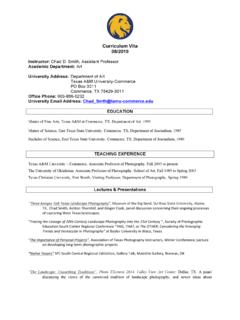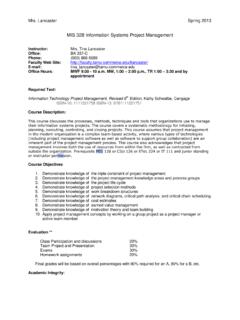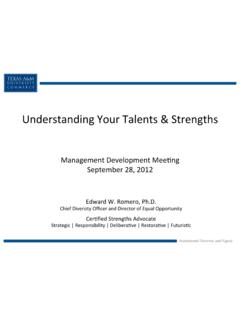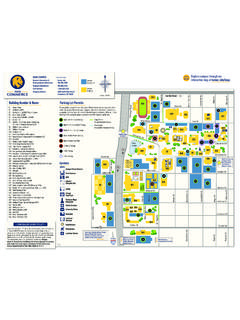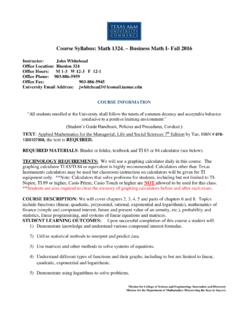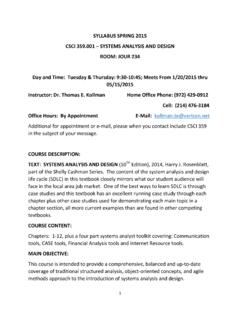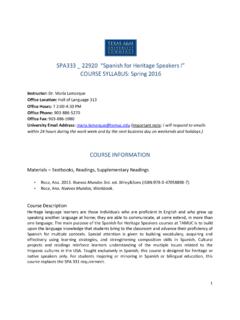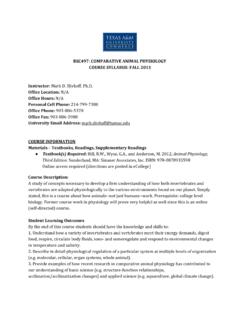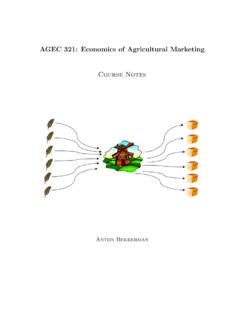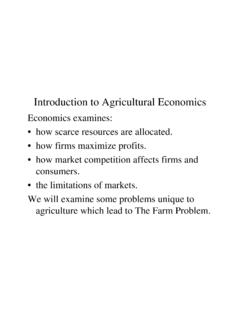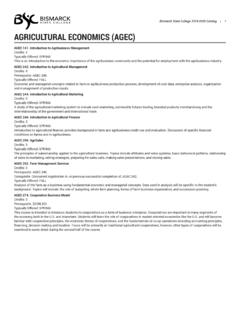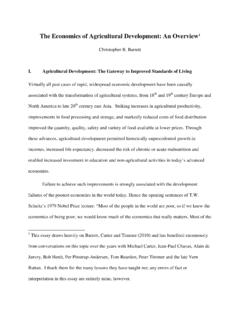Transcription of AEC 219 - Agricultural Economics
1 1 aec 219 : Agricultural Economics texas A&M university - commerce School of Agriculture Fall 2016 Syllabus INSTRUCTOR: Dr. Rafael Bakhtavoryan Office: Agricultural Science Building, Room 154 Phone: (903) 886-5367 Email: (please, use only this email address and put " aec 219 " in the subject of the email) CLASS SECTION: 01W (Web-based) CLASS MEETING: Web-based OFFICE HOURS: My scheduled office hours are from 12:30 to 1:30 Tuesday and Thursday, or by appointment (email is the best way of communication for making appointments). Also, I keep an open-door policy. So, feel free to stop by my office and ask questions anytime. In case I am not available or cannot meet with you at that time, send me an email and we will make an appointment. READING: Required: PowerPoint Presentations which will be provided on eCollege. Recommended: Textbook: Agricultural Economics by H. Evan Drummond and John W. Goodwin. Prentice-Hall, Inc., New Jersey, 3nd Ed., 2011. (ISBN 9780136071921).
2 PREREQUISITES: None. COURSE DESCRIPTION: A study of economic principles, with emphasis on their application to the solution of farm, agribusiness, and Agricultural industry problems. STUDENT LEARNING OUTCOMES: After studying all materials and resources presented in this course, students will be able to: 1. Understand the structure of the Agricultural sector of the US economy. 2. Apply economic principles to understand the conduct and performance of individual producers and the Agricultural industry. 3. Understand the concepts of consumer choice under income constraint and market demand. 4. Understand the market structure in agriculture that affects farm/ranch level and consumer level prices. LECTURE TOPICS: Part I: Foundations The Food Industry Chapter 1 introduction to Agricultural Economics Chapter 2 introduction to Market Price Determination Chapter 3 2 Part II: Microeconomics The Theory of Consumer Behavior Chapter 8 The Concept of Elasticity Chapter 9 The Firm as a Production Unit Chapter 4 Costs and Optimal Output Levels Chapter 5 Supply, Market Adjustments, and Input Demand Chapter 6 Imperfect Competition and Government Regulation Chapter 7 GRADING POLICY: Your grade for the semester will be a weighted average of homework assignments, four equally weighted exams, and a comprehensive final exam.
3 Homework assignments 10% Exam 1 15% Exam 2 15% Exam 3 15% Exam 4 15% Final exam 30% GRADING SYSTEM: Course grading is done according to the following scale: Range Letter Grade 90-100 A B C D Less than 60 F HOMEWORK ASSIGNMENTS (HAs): Homework assignments are assigned regularly (see the course schedule at the end of the syllabus) and must be completed individually. As a form of experiential learning, HAs help students sharpen their analytical skills. Students must turn in their HAs in Microsoft Word format (or at least in pdf format, although the Word format is encouraged) via eCollege (through Dropbox) according to the course schedule. HAs must be submitted by 11:59 (Central Time) on the due date. While it is my strong belief that you should be able to do the HAs after reading the chapter, you can ask questions related to HAs by emailing them to me. I will do my best to answer them only during business hours by guiding you in the right direction or providing you with hints.
4 No late HAs will be accepted and a grade of zero will be assessed for missed HAs. EXAMS: Exams will be administered through eCollege (see the course schedule at the end of the syllabus for specific exam dates). Exams have to be completed by 11:59 (Central Time) on the due date. Exams will be timed and you will have 1 hour and 30 minutes to complete the exam. Make sure you have internet access ahead of time and that your laptop battery is fully charged. No make-up exams will be given. If an exam is missed a grade of zero will be assessed for it. Exams have to be completed individually using your own student account and there should be no collaboration or sharing of work with your classmates on the exams. Final exam is comprehensive and you will have 2 hours to complete it. 3 A ROADMAP FOR SUCCESS IN aec 219 & MY EXPECTATIONS OF YOU: 1. Read the assigned PowerPoint slides. 2. Complete and turn in course assignments and exams at the scheduled time. 3. Use the web to actively seek out other Economics sources that fit your learning style and help you better understand the material.
5 4. Be prepared for exams. COURSE SCHEDULE: A tentative course schedule detailing the material that will be covered in each week and the dates of HAs and exams is provided at the end of the syllabus. This course schedule is subject to change and we will make adjustments as needed. Students will be notified of any changes ahead of time. eCOLLEGE: Class-related material and information will be available on eCollege website ( ). It is your responsibility to check the website and download the appropriate class material. You will need your CWID and password to log in to the course. If you do not know your CWID or have forgotten your password, contact Technology Services at or IMPORTANT DATES: August 29th, Monday: First Day of Classes. December 9th, Friday: Fall Last Class Day. December 10th 16th: Fall Finals Week. STUDENTS WITH DISABILITIES: The Americans with Disabilities Act (ADA) is a federal anti-discrimination statute that provides comprehensive civil rights protection for persons with disabilities.
6 Among other things, this legislation requires that all students with disabilities be guaranteed a learning environment that provides for reasonable accommodation of their disabilities. If you have a disability requiring an accommodation, please contact: Office of Student Disability Resources and Services texas A&M university - commerce Gee Library Room 132 Phone (903) 886-5150 or (903) 886-5835 Fax (903) 468-8148 COUNSELING CENTER: A student that faces a crisis or a serious and unforeseeable event that affects his/her class performance must contact the Counseling Center, Student Services Building, Room 204, Phone (903) 886-5145. If important class material or course assignments are missed because of such crisis or event, the student must contact the instructor as soon as possible. GENERAL POLICIES FOR CLASSES: All students enrolled at the university will follow the tenets of common decency and acceptable behavior conducive to a positive learning environment. See Student s Guide Handbook, Rules and Procedures, Code of Student Conduct ( ).
7 4 ACADEMIC INTEGRITY: Students must follow the Code of Student Conduct in the Student Guidebook ( ). Any form of plagiarism or academic dishonesty will not be tolerated. Academic honesty is defined on Chapter 13 Students (Academic) of the TAMUC Rules and Procedures ( ): Academic dishonesty includes, but is not limited to, plagiarism (the appropriation or stealing of the ideas or words of another and passing them off as one s own), cheating, collusion (the unauthorized collaboration with others), and abuse (destruction, defacing, or removal) of resource material. CAMPUS CONCEALED CARRY: texas Senate Bill - 11 (Government Code , et al.) authorizes the carrying of a concealed handgun in texas A&M university - commerce buildings only by persons who have been issued and are in possession of a texas License to Carry a Handgun. Qualified law enforcement officers or those who are otherwise authorized to carry a concealed handgun in the State of texas are also permitted to do so.
8 Pursuant to Penal Code (PC) and A&M- commerce Rule , license holders may not carry a concealed handgun in restricted locations. For a list of locations, please refer to and/or consult your event organizer. Pursuant to PC , the open carrying of handguns is prohibited on all A&M- commerce campuses. Report violations to the university Police Department at 903-886-5868 or 9-1-1. TECHNOLOGY REQUIREMENTS: The following information has been provided to assist you in preparing to use technology successfully in this course. - Internet access/connection high speed recommended (not dial-up) - Word Processor ( MS Word or Word Perfect) Additionally, the following hardware and software are necessary to use eCollege: Our campus is optimized to work in a Microsoft Windows environment. This means our courses work best if you are using a Windows operating system (XP or newer) and a recent version of Microsoft Internet Explorer ( , , or ). Your courses will also work with Macintosh OS X along with a recent version of Safari or better.
9 Along with Internet Explorer and Safari, eCollege also supports the Firefox browser ( ) on both Windows and Mac operating systems. It is strongly recommended that you perform a Browser Test prior to the start of your course. To launch a browser test, login in to eCollege, click on the myCourses tab, and then select the Browser Test link under Support Services. 5 aec 219 : Agricultural Economics Course Schedule, Fall 2016 Web Based 8/29/2016 through 12/16/2016 Weeks Topic/All assignments are due on specific dates listed below by 11:59 Week 1 Aug 29 Sep 4 Syllabus & eCollege Tutorial Week 2 Sep 5 Sep 11 Chapter 1. The Food Industry, Homework Assignment (HA) 1 Week 3 Sep 12 Sep 18 Chapter 2. introduction to Agricultural Economics , HA 2 Week 4 Sep 19 Sep 25 Chapter 3. introduction to Market Price Determination, HA 3 Week 5 Sep 26 Oct 2 EXAM 1. Chapters 1, 2, 3 Week 6 Oct 3 Oct 9 Chapter 8. The Theory of Consumer Behavior, HA 4 Week 7 Oct 10 Oct 16 Chapter 9.
10 The Concept of Elasticity, HA 5 Week 8 Oct 17 Oct 23 EXAM 2. Chapters 8, 9 Week 9 Oct 24 Oct 30 Chapter 4. The Firm as a Production Unit, HA 6 Week 10 Oct 31 Nov 6 Chapter 5. Costs and Optimal Output Levels, HA 7 Week 11 Nov 7 Nov 13 EXAM 3. Chapters 4, 5 Week 12 Nov 14 Nov 20 Chapter 6. Supply, Market Adjustments, and Input Demand, HA 8 Week 13 Nov 21 Nov 27 Chapter 7. Imperfect Competition and Government Regulation, HA 9 Week 14 Nov 28 Dec 4 EXAM 4. Chapters 6, 7 Week 15 Dec 5 Dec 9 Study week Week 16 Dec 10 Dec 16 FINAL EXAM. Chapters 1 through 9 NOTE: The instructor reserves the right to make changes to the syllabus and the course schedule as needed. If changes are made, you will be notified of them ahead of time.
